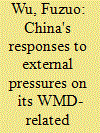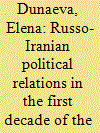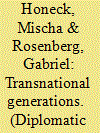|
|
|
Sort Order |
|
|
|
Items / Page
|
|
|
|
|
|
|
| Srl | Item |
| 1 |
ID:
140140


|
|
|
|
|
| Summary/Abstract |
The root causes of the current severe standoff between Russia and the West over Ukraine, at times reminiscent of the worst years of the Cold War, have puzzled both pundits and politicians alike. Some of the reasons are on the surface, while others may take a while to unearth. In any case the conflict is not just a routine clash of geopolitical interests. In fact, Russia and the West are experiencing another moment of truth. Both sides will analyze this period and the conclusions will shape the future.
|
|
|
|
|
|
|
|
|
|
|
|
|
|
|
|
| 2 |
ID:
190736


|
|
|
|
|
| Summary/Abstract |
China has been consistently staking claim to the entire South China Sea (SCS) citing historical linkages. The consistent nature of these claims point towards the long-term nature of China’s interests, from nationalism and reclaiming lost territories to commercial and geostrategic interests. The onset of COVID-19 in Wuhan in November 2019 and its transformation into a global pandemic witnessed a shift in China’s foreign policy. The article analyses China’s evolving geopolitical interests and recent geopolitical opportunism during COVID-19, by way of unilateral state-level administrative actions, completion of military infrastructure development, conduct of military exercises, aggressive military actions, and wolf warrior diplomacy, to gain operational advantage by changing the status quo in its favour in the SCS in order to subordinate other claimants and dominate the region.
|
|
|
|
|
|
|
|
|
|
|
|
|
|
|
|
| 3 |
ID:
137502


|
|
|
|
|
| Summary/Abstract |
China, although a member of most of the international non-proliferation and multilateral export control regimes and having a law-based comprehensive export control system, has not fully complied with its non-proliferation obligations, which is evidenced by not only the US's sanctions on some Chinese entities for their weapons of mass destruction (WMD) related exports but also some external disclosures in this regard. Faced with these external pressures, China's responses have been both reactive and proactive. The rationale for China's mixed responses can be attributed to its security interest in preventing nuclear terrorism, geopolitical interests in South Asia, economic interests in procuring oil supplies, high-tech imports and missile export markets, in addition to its status interest in building a ‘responsible great power’ identity in the international community.
|
|
|
|
|
|
|
|
|
|
|
|
|
|
|
|
| 4 |
ID:
171226


|
|
|
|
|
| Summary/Abstract |
Geopolitical interests and concerns motivate India’s renewed push for subregional connectivity. The evolving subregional approach aims at re-integrating India’s immediate neighborhood with the aim of protecting New Delhi’s traditional regional primacy. Historically, the Partition of the Indian subcontinent terminated a well-connected common space. Decades after its independence, India has turned toward reconnecting with its immediate neighbors clustered in subregions in the changing geopolitical context. India’s subregional approach has emerged as a key area of foreign policy priority. This paper attempts to map out India’s evolving subregional approach and explicates the strategic rationale behind it. Even as India has pushed to expand subregional connectivity, there are both domestic as well as external challenges. The article examines how India has been addressing some of the major hurdles underlining their policy implications. First, the conceptual underpinnings of India’s evolving subregional approach are explicated followed by an analysis of the factors driving this push. Subsequently, key subregional projects initiated by India are discussed. Finally, the challenges facing India in managing subregional initiatives are examined.
|
|
|
|
|
|
|
|
|
|
|
|
|
|
|
|
| 5 |
ID:
101868


|
|
|
|
|
| Publication |
2010.
|
| Summary/Abstract |
THE BREAKUP OF THE USSR signified the start of the process of geopolitical changes everywhere in the former Soviet Union. Many regions have become spheres of national interests of the world's leading states. The geopolitical importance of the Caucasus is indisputable and not accidental. One possible proof is that more than 30 states have declared the Caucasus to be the zone of their interests.
|
|
|
|
|
|
|
|
|
|
|
|
|
|
|
|
| 6 |
ID:
118743


|
|
|
|
|
| Publication |
2012.
|
| Summary/Abstract |
Everyone knows that in addition to its keen interest in the Southern and Northern Caucasus, the People's Republic of China (PRC) is also active in Central Asia, another area of its geopolitical interests.
Much has and is being written about this, but for some reason no one has examined China's presence in the Northern Caspian (I have in mind the Atyrau Region of Kazakhstan, the relations with which are part and parcel of China's Central Asian policy, and the Astrakhan Region and Kalmykia of Russia).
Here I will dwell on Chinese strategy in the two latter regions of the Russian Federation, that is, in the Russian part of the Northern Caspian. As a sort of corridor or link between Central Asia and the Caucasus with a multitude of ties between them and this part of Russia, the region is of immense geopolitical importance for Beijing.
|
|
|
|
|
|
|
|
|
|
|
|
|
|
|
|
| 7 |
ID:
138064


|
|
|
|
|
| Summary/Abstract |
ANSWERS to the following very important questions will clarify Russia's and China's Central Asia policies and their relationship in the region: What are the region's most attractive features? Why does it attract big international players, including Russia and China? What are the Russian and Chinese interests which are intertwined there to create a space of bilateral and multisided cooperation and rivalry? How have Russia and China changed their Central Asia policies since the 1990s? What are their dynamics and basic principles?
|
|
|
|
|
|
|
|
|
|
|
|
|
|
|
|
| 8 |
ID:
120866


|
|
|
|
|
| Publication |
2013.
|
| Summary/Abstract |
In the 1990s, Russia and Iran successfully laid the foundations for interaction and expanded their spheres of cooperation. At the beginning of the twenty-first century, their relations developed unevenly. These fluctuations depended on the combination of global and regional factors, as well as on the internal circumstances in each country. Russia's participation in international sanctions has aroused discontent in Iran. Despite this, the political establishments of both countries continue to demonstrate an interest in developing bilateral relations and to reaffirm their shared geopolitical interests. This paper analyzes foreign policy documents and the latest research by Russian and Iranian scholars. It strives to shed light on the question: "To what extent and in what areas do the interests of Russia and Iran coincide, and what is the foundation for their potential future development?"
|
|
|
|
|
|
|
|
|
|
|
|
|
|
|
|
| 9 |
ID:
132013


|
|
|
|
|
| Publication |
2014.
|
| Summary/Abstract |
The Cold War had just turned hot on the Korean Peninsula in late June 1950 when Deon Smith, a young Boy Scout from Mt. Vernon, Illinois, pitched his tent in Valley Forge. Fears of a global cataclysm loomed over the Revolutionary War battlefield, where nearly 50,000 Boy Scouts from the United States and twenty allied nations had gathered to celebrate Independence Day. Their jamboree marked the biggest encampment of youth on American soil to date, big enough to garner an address by President Harry Truman. "I hope that you young men … will take home from this jamboree a clearer understanding of the meaning of human brotherhood," said Truman. "I hope that you will work for freedom and peace with the same burning faith that inspired the men of George Washington's Army here at Valley Forge."1 Given the geopolitical context, the subtext was clear: "freedom and peace" required the "burning faith" of fighting men. Irony, as well as faith, burned in Truman's comments. Beyond the rhetoric of global brotherhood, Truman's internationalist overtures obscured particular national geopolitical interests on the peninsula and cast communism as an inhuman menace. Meanwhile, even as the grand statesman rallied the crowd, Deon Smith was busy forging international ties of his own-ties that did not grow out of security concerns but were driven by juvenile excitement and curiosity. He took part in various "Scoutcraft events" and "inter-camp visits," traded souvenirs with his distant peers, and formed friendships with Scouts from near and far. "Some of the most interesting groups we have met," Smith wrote, "are the Scouts from foreign lands," including boys from the former enemy nations of Germany and Japan. In this, Smith explored internationalism rather than merely assuming it. Who, then, assembled universal brotherhood more decisively at this jamboree: the president, whose speech recoded the chaos, flux, and pleasures of a sprawling encampment in the overdetermined, ironically nationalist registers of liberal internationalism, or the boy, whose handshakes gave literal flesh to Truman's rhetoric?2
|
|
|
|
|
|
|
|
|
|
|
|
|
|
|
|
| 10 |
ID:
102090


|
|
|
|
|
| Publication |
2010.
|
| Summary/Abstract |
The author puts forward a vector approach to identifying Russia's geopolitical interests that helps formulate an effective strategy to advance and protect them and elevate the country's role in the world.
|
|
|
|
|
|
|
|
|
|
|
|
|
|
|
|
| 11 |
ID:
149727


|
|
|
|
|
| Summary/Abstract |
THE WEST, shocked by Crimea's voluntary re-unification with Russia, qualified the latter's actions as an undisguised challenge to the world order and started talking about it as one of the gravest threats to international security.1 There are appeals to the Western community to close ranks to stop Moscow's aggression against the East European countries even though nobody in the Baltic states, none of which is favorably disposed to Russia, believes that this scenario might be realized.2
|
|
|
|
|
|
|
|
|
|
|
|
|
|
|
|
|
|
|
|
|